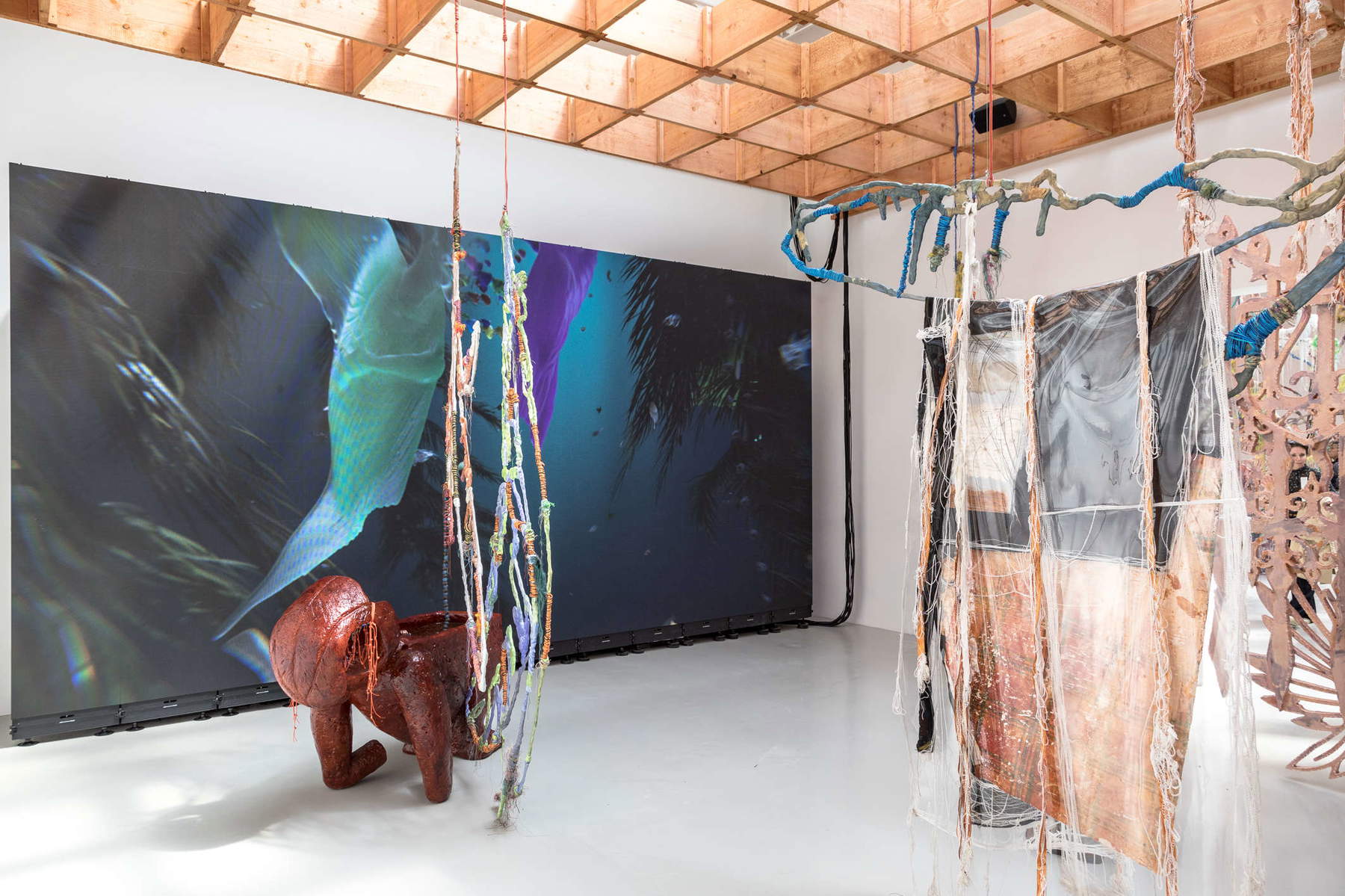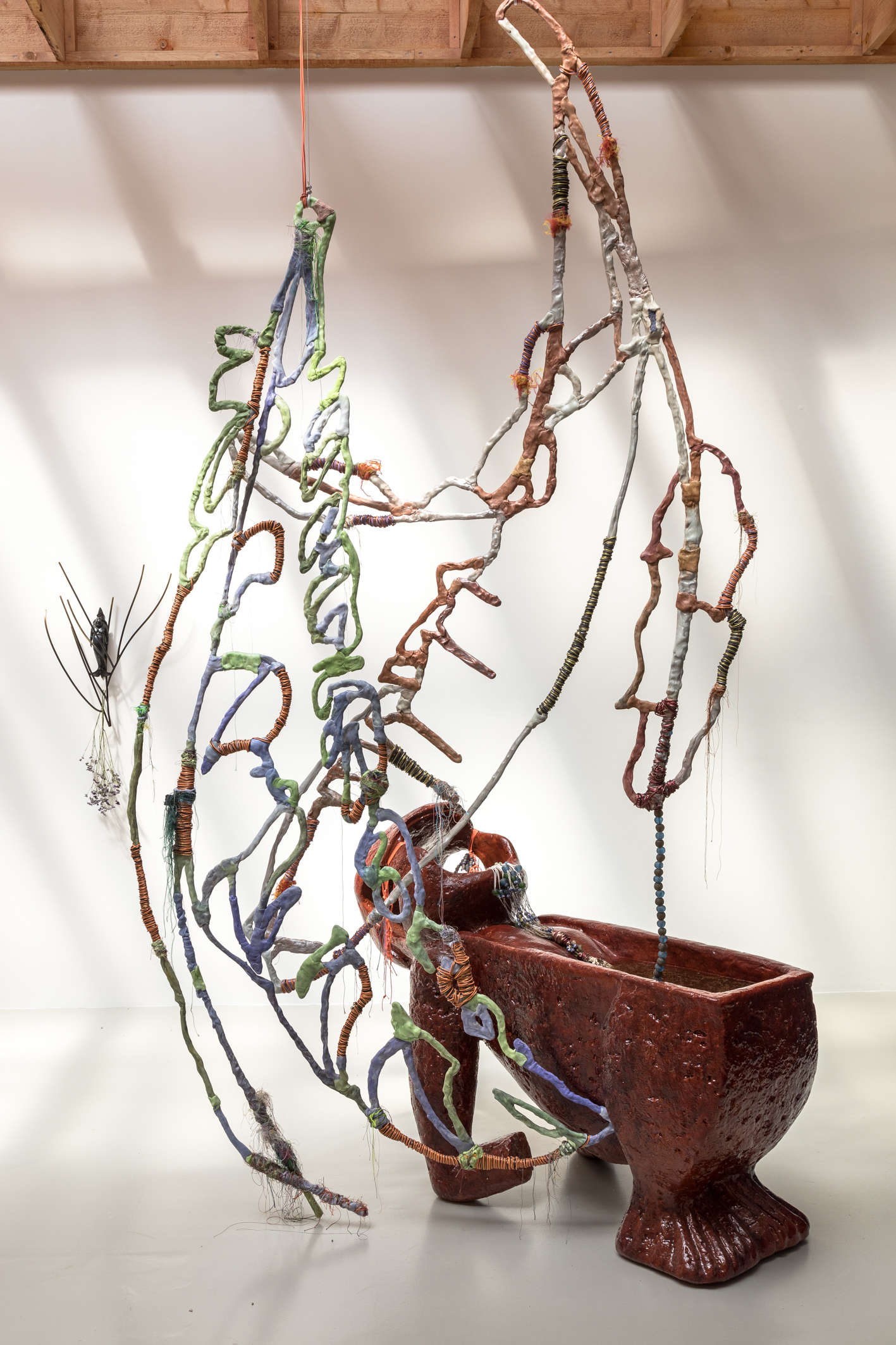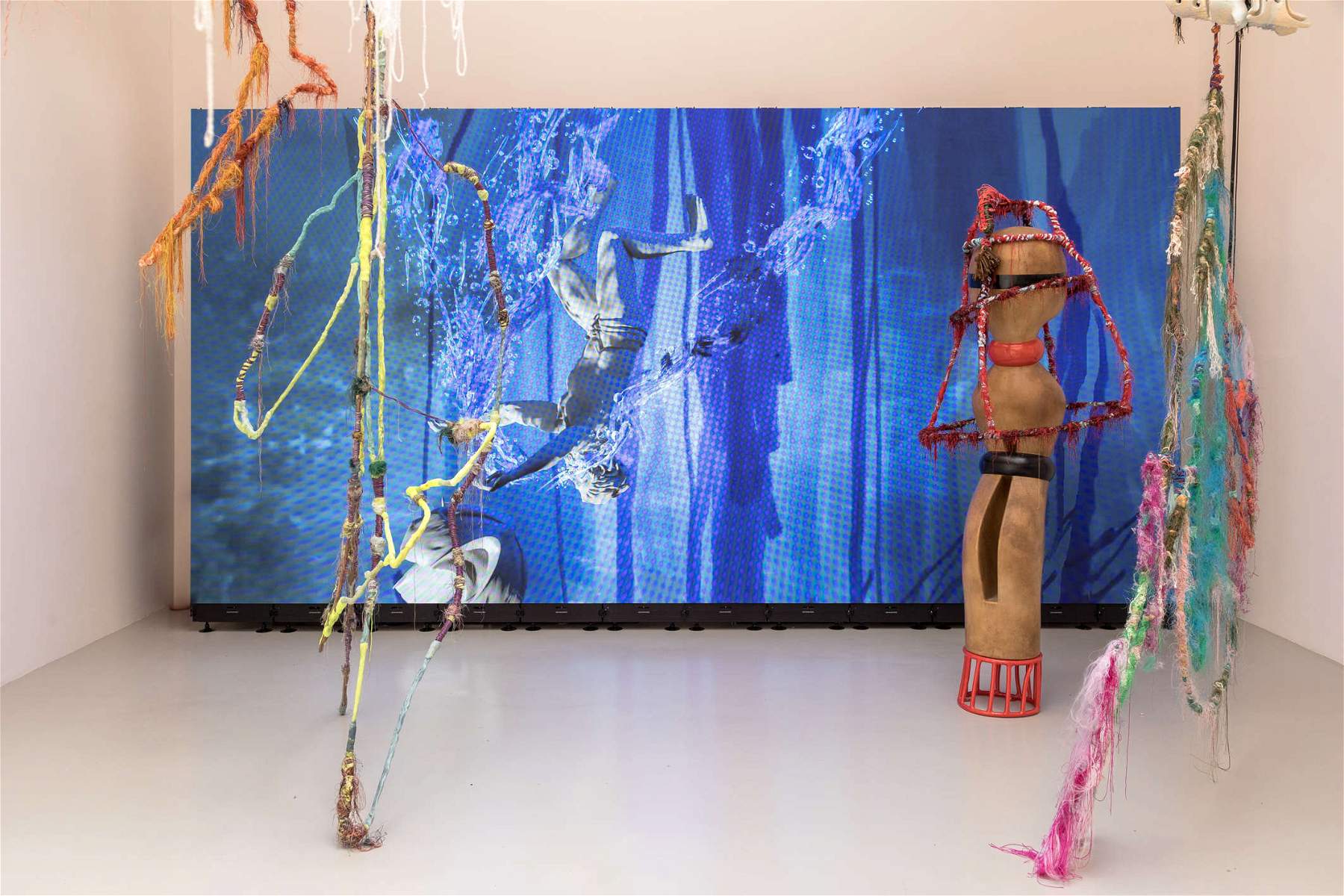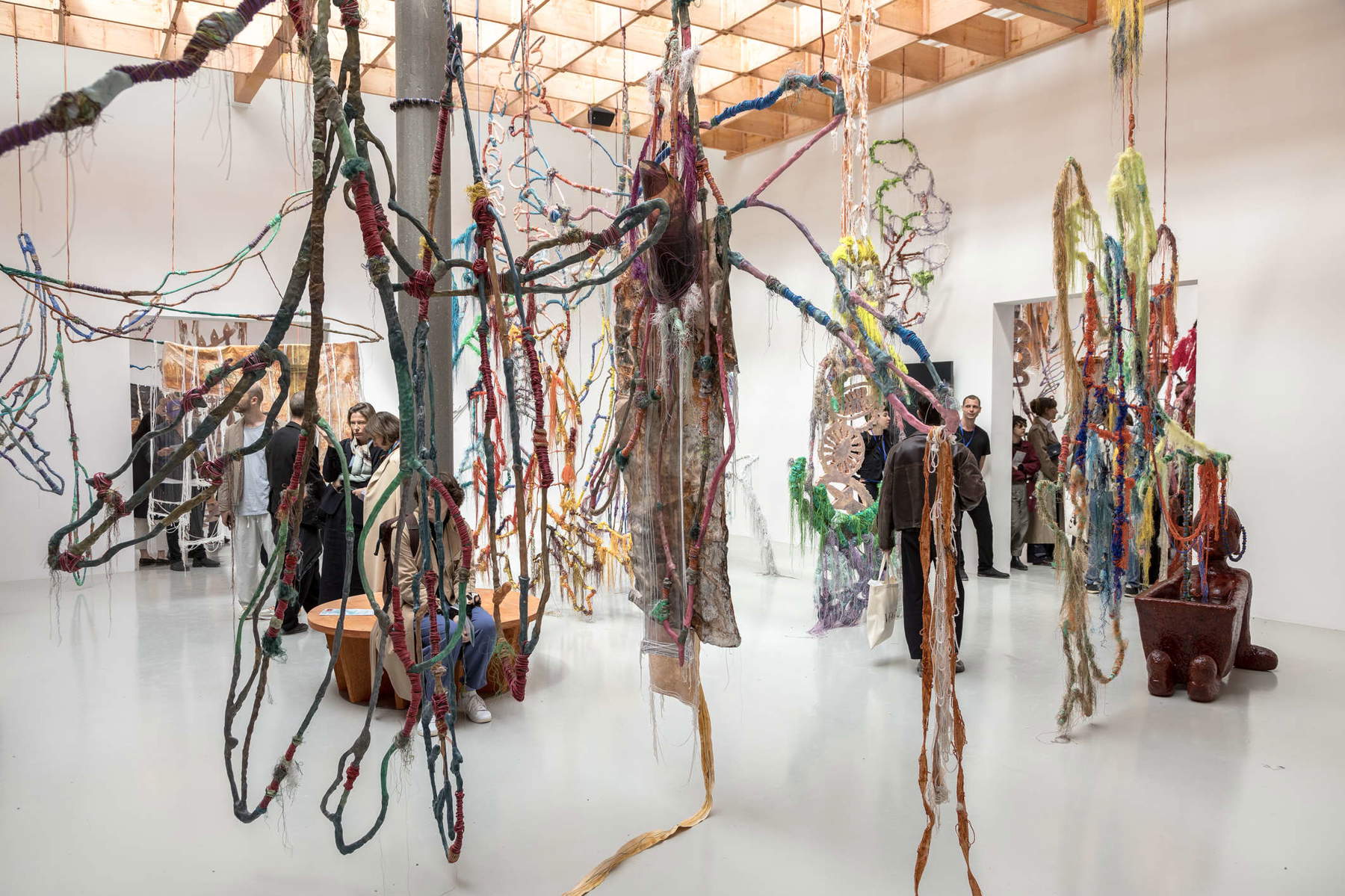The title of the 60th International Art Exhibition - La Biennale di Venezia, "Strangers Everywhere," proposed by Adriano Pedrosa, gave a clear political and social orientation to the 2024 event. This title makes direct reference to the work of the Paris-based Claire Fontaine collective, a group inspired by an anti-racist movement in Turin in the 2000s, and is a way of shifting attention to issues of migration, otherness and marginality. For this, France chose to entrust its Pavilion to Julien Creuzet (Paris, 1986), whose work entitled Attila cataract your source at the feet of the green peaks will end up in the great sea blue abyss we drowned in the tidal tears of the moon -("Attila cataract your source at the feet of the green peaks will end up in the great sea blue abyss we drowned in the tidal tears of the moon") is strongly influenced by the presence of such issues. Supported by his two curators, Céline Kopp, director of Magasin, the National Center for Contemporary Art in Grenoble, and Cindy Sissokho, curator, cultural producer and writer, the artist nominated for the Marcel Duchamp Prize 2021 is one of the youngest creators to represent the French Pavilion in Venice, but already an influential figure on the international scene.
Julien Creuzet presents an immersive installation that initiates a dialogue between the imaginary founders and myths of our hybrid societies. In his work, water, seas and oceans serve as vehicles for his vision of history, movements of people, ideas and forms. The references he draws from different geographies, around the Caribbean, Latin America and West Africa, have their echoes on the European continent and in Venice. Through this choice, the French Pavilion welcomes an artist with a multifaceted panorama, working with different media, including visual arts, video, and poetry. From the outset, he decided to make hospitality and dialogue the distinctive themes of his adventure at the Biennale. This openness and desire for interaction and dialogue are central to his work and career, fueled by the many imaginative sources of the Caribbean, Martinique, where he grew up, and the interface between European, African, and Indian cultures. Julien Creuzet invites us to broaden our focus and see the French Pavilion as a space of mobility, visibility and rediscovery. True to his desire to create the conditions for a “great moment of life and togetherness,” he chose to unveil his project to the press in Martinique as the first phase of this open pavilion, which is also an invitation to celebrate the Caribbean art scene. In Venice, the Institut français has also chosen to bring together the theme of this year’s event. For the first time, on the days dedicated to the professional community, it will organize a unifying event around the French presence in Venice in the form of a breakfast. “Café français” will provide an opportunity for professionals from France and abroad to meet and chat.
The catalog includes a series of unpublished works by Julien Creuzet along with excerpts from literary texts that reveal imagery shared among African diasporas and related to his work. Five researchers were invited to propose titles that influenced both their imaginations and their work. These texts contribute to form a book published by Beaux-Arts de Paris in collaboration with the Institut français, due April 17, 2024. Julien Creuzet’s book constitutes one of the two dimensions of the catalog, along with the “sound pieces” that will be available in oral form online. These sound pieces, which accompany the texts, bring the works to life through readings and interviews, creating a multisensory experience for readers.
“What I want to offer visitors to this Pavilion is a complex, sensory confluence zone to deeply lived experience. For me, this is exactly that space is about. It is an intersection, a place where you can encounter anything, especially yourself.”





Born in 1986, Julien Creuzet is a French-Caribbean artist who lives and works in Montreuil. He creates protean works that incorporate poetry, music, sculpture, assemblage, cinema and animation. In his evocation of multiple transoceanic time scales and postcolonial exchanges, the artist places past, present and future legacies at the center of his work. Ignoring global narratives and cultural reductionism, Julien Creuzet’s work often highlights anachronisms and social realities with the aim of constructing irreducible objects. Resembling relics of the future brought back to earth by an ocean tide, Julien Creuzet’s works take the form of amplified testimonies to history, technology, geography, and himself. Julien Creuzet’s work has been featured in numerous solo exhibitions, including at Magasin CNAC in Grenoble (FR), curated by Céline Kopp and Cindy Sissokho, until May 26, 2024, and recently at LUMA in Arles and Zurich (FR and CH) in 2022 and 2023. He also exhibited at Camden Art Centre in London (UK) in 2021, at Palais de Tokyo in Paris (FR) and CAN Centre d’Art Neuchâtel (CH) in 2019, and at Fondation d’Entreprise Ricard in Paris (FR) and Bétonsalon in Paris (FR) together in 2018. In addition, Julien Creuzet has participated in numerous institutional exhibitions, including the Performa Biennial 2023 (US), the 35th São Paulo Biennial (BR), and the 12th Liverpool Biennial (UK), all in 2023. He has also exhibited at the Museum of Contemporary Art in Chicago (USA) and Musée Tinguely in Basel (CH) in 2022, the National Gallery in Prague (CZ) in 2022, the Wesleyan University Center for the Arts in Middletown (USA) and 19 CRAC Montbéliard (FR) in 2021, at Manifesta 13 in Marseille (FR) in 2020, at the Museum of Modern Art in Paris (FR) in 2019, and at the Kampala Biennial (UG) and the Gwangju Biennial (KR) in 2018. Julien Creuzet’s works are included in such prestigious collections as those of the Pompidou Center (FR), the CNAP (FR), the MMK Museum (DE), the Datris Foundation Villa (FR), the Fondation d’entreprise Galeries Lafayette (FR), the Fondation d’art Contemporain in Paris (FR), the FRACs (Burgundy, Champagne-Ardenne, Grand Large, Île-de-France, Méca, Pays de la Loire) (FR), the Carré d’Art-Musée d’art contemporain (FR), and the Kadist Foundation (US). Julien Creuzet is represented by DOCUMENT, with offices in Chicago and Lisbon; the Andrew Kreps Gallery in New York; and Mendes Wood DM, with offices in São Paulo, Brussels, Paris and New York.
 |
| Biennale, at the French Pavilion a poetic journey into the ocean with Julien Creuzet |
Warning: the translation into English of the original Italian article was created using automatic tools. We undertake to review all articles, but we do not guarantee the total absence of inaccuracies in the translation due to the program. You can find the original by clicking on the ITA button. If you find any mistake,please contact us.